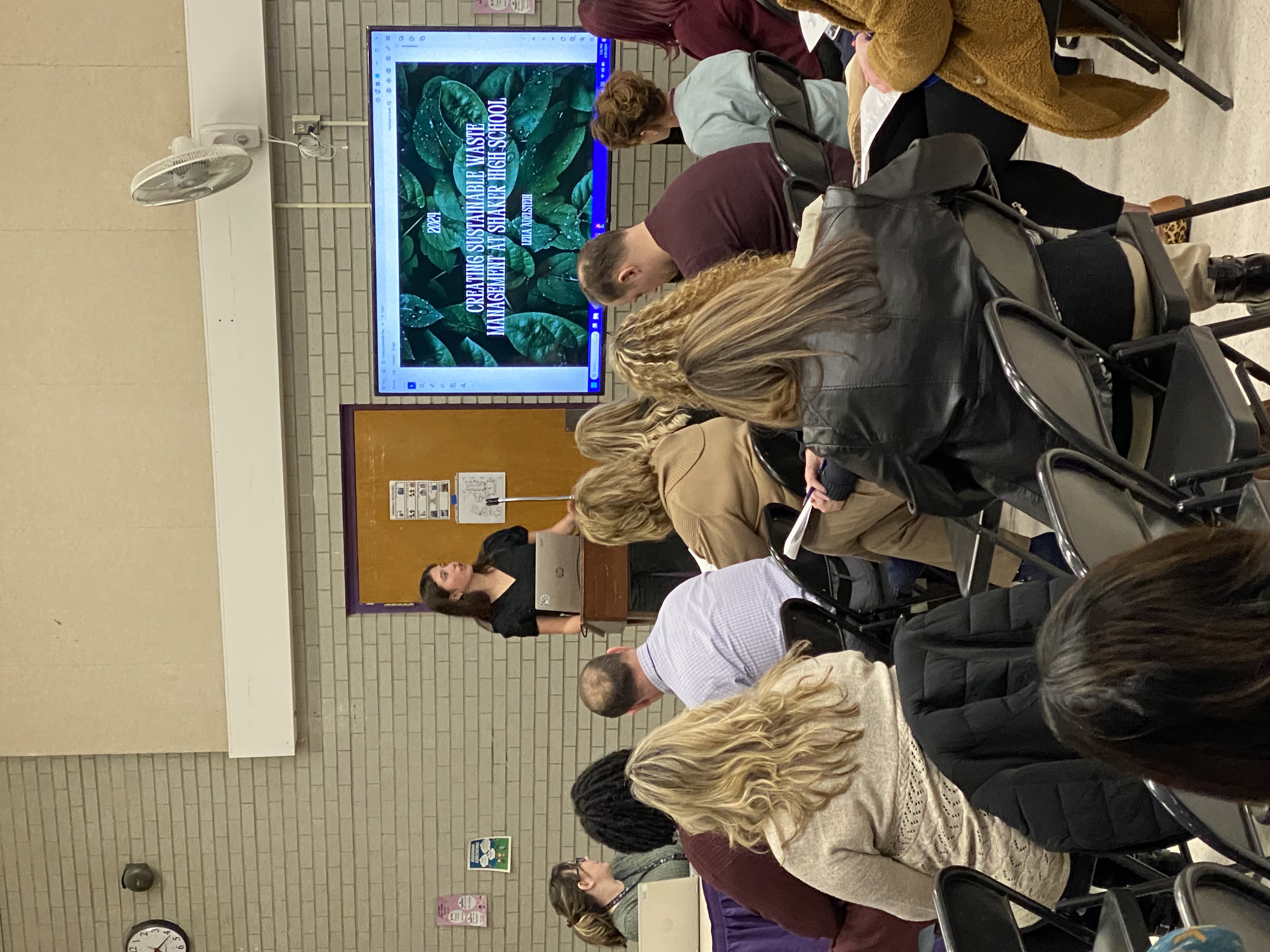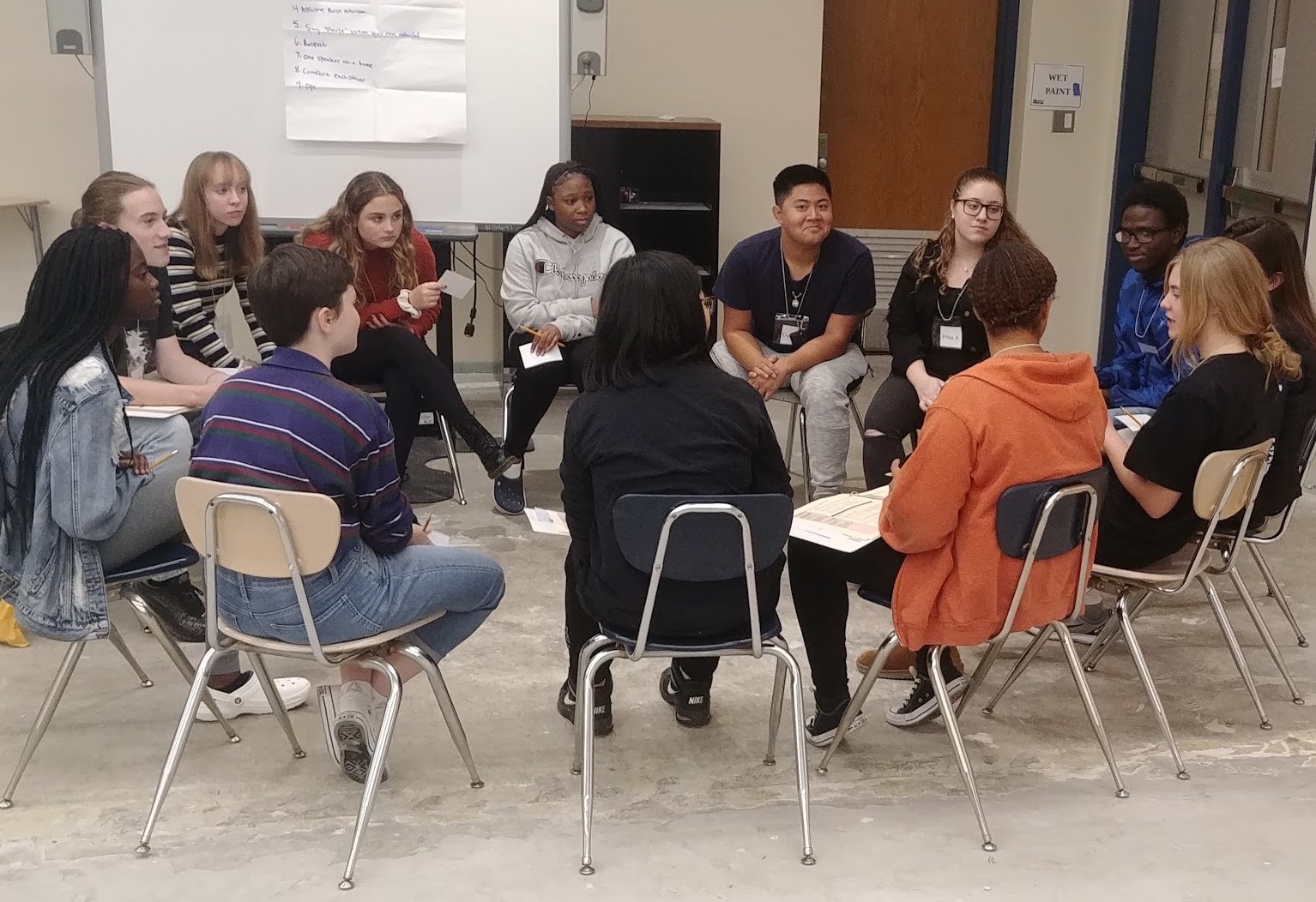Spring 2024: DemocracyReady NY Youth Members Explore the Role of Tech in Civic Learning

Staying Present and Aware: The Value of Civic Engagement and Critical Thinking for Teenagers
Being a member of DRNY has shown me that youth voices, opinions, and actions are forces that help bring real change.
When registering for my senior year courses, I enrolled in a class called Civic Engagement because it was an opportunity to create change in my school community and earn the New York State Seal of Civic Readiness The Seal is a way to recognize students’ commitment to creating positive change in their community, and executing this type of project allows young people to gain experience in the world of social justice and political action. There was a project I had envisioned since ninth grade: initiate a composting program in my school’s cafeterias.

Intersecting Citizenry and Technology
Nobody understands technology and politics like the younger generation. That statement relies on two key factors about Gen Z. The first is that they are not tech savvy, they’re tech native.
The past few years have seen tectonic shifts in arguably the two most important fields for everyday people, politics and technology. Oftentimes, the conversations regarding both areas go hand-in-hand, and you may have seen the following statements (ostensibly) online: 1. Social media is worsening the political divide. 2. Nobody understands politics nowadays.
As a high school student who has been working in both fields for some time now, I feel that I have something to bring to the discussion.
Consumer Smarts: Reclaiming Control through Media Literacy
Technology is changing expression and communication, but that doesn’t mean it's dangerous. A quote from one of my peer interviews sums up the general consensus, “The information we get on the Internet is really messed up, you don’t know what’s true.” We know the danger, we know our own limits, now it’s time to know what to do with this uncertainty. In the future I hope that all kids of all states can have access to media literacy education as I experienced in my first semester in college.
Students Deserve To Be Storytellers
Positioning students as storytellers is necessary, not only to better understand student perspectives, but also to more deeply understand the policy issues themselves.
Storytelling can be a fantastic way to facilitate more meaningful and interactive curriculum, particularly in schools. In the civics classroom specifically, storytelling can provide an excellent opportunity to think through civic issues all around us, recognizing how tangible each singular issue is.
Tech-Driven Civics: Preparing Students for the Digital Age of Democracy
Despite technology being integrated into education at a continuously larger scale year after year, there has been little attention given to issues surrounding media literacy, which is the ability to access, analyze, evaluate, and create media in various forms.
This past year at the DemocracyReadyNY Coalition, I, alongside my fellow youth cohort members, and other members of the Coalition, have dedicated our efforts to creating a space for dialogue and creative solutions to address the gap at the intersection of media literacy and civic education. Understanding media literacy is crucial for informed and engaged citizenship, making it an essential component of comprehensive civic education.
Spring 2023: DemocracyReady NY Youth Members Unpack Student Councils in New York State

Prom and Beyond: Reflections on NY's Student Council Bill
Senate Bill S1732 symbolizes historic investment in student leadership across New York State. This is great; however, student leadership must go beyond symbols and tokens.
I am a 2022 graduate of Syracuse City Schools in upstate New York. Throughout my K-12 education, I found the importance of true student voice and advocacy to better the civic climate in a school. Typically these values are assumed to be in high school student council bodies — however, student councils 1) do not exist at every high school, and 2) their scope of work varies drastically.
Empowering Student Voice: Unleashing the Potential of Student Councils in Schools
As a recent graduate from New Rochelle High School, I have had the opportunity to see how a student government that represented over 3,000 students operated first hand.
Student councils have long been recognized as important entities within educational institutions, contributing significantly to the student experience and empowering students to have a voice in school matters. Acknowledging the significance of these bodies, New York Senate Bill S1732 sets out to address a pressing concern: the absence of student governments in schools and districts across the state. This bill will mandate the establishment of student governments in every school in New York. However, we must question whether this requirement alone is sufficient to genuinely represent student voices and grant them meaningful decision-making power in their school settings.
Should All High Schools Have Student Councils?
Are student governments the key to ensuring students’ voices are heard, or are they simply a popularity contest?
In keeping with its title, DemocracyReady NY seeks to foster a representative learning environment across schools in New York State. After organizing the DemcoracyReady NY Civic learning week, I made it clear to my fellow participants that student input was the key to advancing education. Speaking with educators and policymakers about the problems we observed in the educational system helped us gain clarity, or on the other side, provided us with a strategy to attempt to fix it. It only took us, the students, to speak up. Entering into the DemocracyReady NY Youth Ambassador program, the need for student voice was at the forefront of my thoughts.
Student Power Unleashed: NY Senate Bill S1732 Igniting Civic Engagement for a Brighter Future
3 Ways to Enhance NY's Senate Bill S1732 for Stronger Student Engagement
While the bill represents a step in the right direction, its requirement for student governments in schools alone may not be sufficient to amplify student voices. Given the limited number of positions available within the student council, not all students will have the opportunity to actively participate in civic matters, especially in schools with a significant student population. A pertinent example is Francis Lewis High School, which accommodates 4,000 students but only offers 19 spots on the student council. Consequently, it is imperative to consider further enhancements to the bill's recommendations.
Reflections on NY Civic Learning Week, March 2023
Why Student Power is the Key to Future Civic Participation
Working with high school students from across New York State to plan this webinar, I wondered what made civic engagement so exciting to us but so unreachable and overwhelming for many of our classmates.
A few weeks ago, in my American Government class, my teacher asked, “Who plans to vote when they turn eighteen?” I watched as only half of the class raised their hands. Many who did not plan to vote claimed confidently that their voices did not matter. This apathy toward civic engagement is not unique, and while I used to be shocked when my classmates or friends felt so unequivocally that politics was not “for them,” I’m now only sad, not surprised. For many of my teenage peers, politics and government are not opportunities to create change but abstract systems too complicated to understand, much less to engage with.
Reflections on Civic Learning Week: From Classroom to Everyday
For me, the most valuable part of the committee was listening.
The experience showed me something I don’t think I had grasped before, which was that change starts in small steps. While we can hope that things reach a national level, issues require group effort to bring attention. As Christopher Marte puts it, “Why deviate the message or the narrative to fit something that is happening on the national level, when we all know that politics is local.”
Welcoming a New Perspective
I go to Allegany-Limestone a school that a majority of listeners may have never heard of. It is a small school in Western New York.
The Tiktok sound “Are you from New York even”? constantly played in my head as I wrapped up a Civic Youth Learning event meeting. Whenever I’m traveling and I’m asked where I’m from, I reply New York, and the response is usually “oh you’re from the city?” Unfortunately, no. I am a student from Allegany, New York, a place I’m sure few to none reading this have ever heard of. Despite the fact that it is a nine-hour drive from the city, I found myself recounting my educational experiences with those of the city, attempting to find common ground.
Bridging Education: Including Students' Voices at the Forefront of School Decision-Making
Four ways to have students' voices present everywhere school decisions are made.
Overall, having students' voices present everywhere school decisions are made means creating meaningful opportunities for students to contribute their perspectives and actively participate in shaping their own education and school environment. It promotes a sense of ownership, empowerment, and inclusivity, which can lead to a more positive and engaging educational experience for students.
Creating the Future Through Youth Voices
To have student voices represented is to give students a say on locking bathroom doors, the level of security within the school, or the structure of budgeting for different departments.
From my experience as a teenager in upstate New York, channeling my voice has been especially difficult, due to the struggle to grab attention from the mentors and administration around me. In Syracuse, New York, spending sixteen years of my life in one place, but jumping from school district to the next, I found it immensely difficult to embrace my voice in a community full of diverging opinions and experiences. After heading into Nottingham High School in 9th grade, I noticed a tremendous number of challenges surrounding the school’s environment, specifically on safety, communication, and relationships. Many of my peers commented on the level of uneasiness in my school due to the administration’s strict solutions to behavior control, with little or no input from the students. Hearing from students all over the school about their experience, I knew I wanted change to happen.
Reflecting on "Beyond the Vote: Civic Participation from Classroom to Community"
My participation in the Civic Learning Week event has led me to witness the importance of civic engagement in my school community.
After learning and participating in the civic learning week event, I felt a massive shift in my perspective of civic education. This event has been one of the most transformational leadership experiences I have been involved in. I have always strived to make my school community a better place for my classmates and myself. The DemocracyReady NY Coalition and its civic education panels covered important topics that will help me transform my school into a more civically engaged environment
Decision Making in Schools: Parents, Teachers, and… Seldom Students
As a young person, I know firsthand how our voices are often not asked for, included, or heard.
To me, youth civic learning includes incorporating student voice into decision-making means adult leaders co-creating schools with the young people who attend the schools. Students should have a level of involvement when it comes to hiring school staff, setting schoolwide policies, and determining the curriculum. Our perspectives and experiences are important.